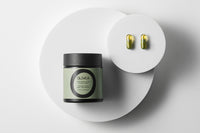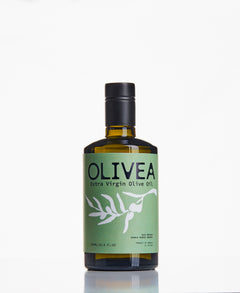Atlas Olive Oil Review: Is Moroccan EVOO Worth It?
Atlas Olive Oil has garnered significant attention in health food circles as a polyphenol-rich olive oil from Morocco. Marketed as "liquid gold" packed with antioxidants, this extra virgin olive oil promises both gourmet quality and wellness benefits. But does it truly deliver on these claims?

In this review, we'll cut through the marketing to examine what's actually in the bottle. You'll discover Atlas's real polyphenol content, how it tastes on food, what verified customers say, and whether it delivers tangible health benefits. Most importantly, we'll compare it to competitors like Olivea Ultra High Phenolic EVOO and Olivea Premium Organic EVOO to determine which offers the best value for your health dollar.
Whether you're looking to reduce inflammation, protect heart health, or simply elevate your culinary experience, this analysis will help you decide if Atlas Olive Oil deserves a spot in your kitchen or if your wellness journey would be better served by superior alternatives.
What Is Atlas Olive Oil?
Atlas Olive Oil is a premium Moroccan extra virgin olive oil crafted by the Aqallal family estate, olive farmers with four generations of tradition dating back to the late 19th century. Their flagship product has earned multiple international awards and is reportedly used by Michelin-rated restaurants.

The oil comes primarily from Picholine du Languedoc olives grown in Morocco's Mediterranean climate, hand-picked and cold-pressed to achieve a low acidity of around 0.2%. While marketed as "polyphenol-rich," Atlas doesn't actually publish its polyphenol content. Distributor inquiries suggest levels around 280 mg/kg—above the European health claim threshold but substantially lower than Olivea's independently verified 600-900+ mg/kg.
Unlike Olivea's distinctive single-origin Greek Koroneiki oils, Atlas blends olives from multiple groves. This approach ensures consistency but sacrifices the exceptional terroir-specific character, unique flavor complexity, and complete traceability that single-origin oils provide. The difference is similar to mass-produced wine versus small-batch estate vintages—both may be good, but connoisseurs recognize the superior qualities of the latter.
In essence, Atlas positions itself between ordinary supermarket oils and truly premium therapeutic options—better than standard oils but lacking the exceptional polyphenol potency and transparency that health-conscious consumers increasingly demand from brands like Olivea.
Olivea: Premium Greek EVOO Alternative to Atlas
Olivea offers two exceptional olive oils that address the same health-conscious market as Atlas but with significantly higher verified polyphenol content. Both Olivea products share key advantages over Atlas:
-
Sourced exclusively from Koroneiki olives grown in Greece's Messinia region
-
Feature single-origin traceability (versus Atlas's blended approach)
-
Undergo cold-pressing within hours of harvest to maximize polyphenol preservation
-
Provide independent laboratory certification of their polyphenol levels
-
Offer superior transparency compared to Atlas's undocumented 280 mg/kg estimate
These fundamental differences make Olivea the better choice for consumers seeking maximum health benefits from their daily olive oil consumption.
Olivea Ultra High Phenolic EVOO

Olivea's Ultra High Phenolic EVOO stands in a class of its own with independently verified polyphenol levels of 900+ mg/kg—over three times Atlas's content. This limited-batch oil delivers up to 20 times more polyphenols than standard olive oil and is naturally rich in hydroxytyrosol, the compound clinically shown to protect LDL cholesterol from oxidation—the first step in heart disease development.
The pronounced peppery bite signifies its exceptional oleocanthal content, delivering potent anti-inflammatory properties. For those using olive oil therapeutically rather than just as a culinary ingredient, Olivea Ultra offers verified potency that Atlas's more modest profile cannot match.
Olivea Premium Organic EVOO

Olivea's Premium Organic EVOO delivers 600+ mg/kg of independently verified polyphenols—more than double the content of Atlas Olive Oil. This USDA Organic certified oil significantly exceeds the European Food Safety Authority's minimum threshold for health claims (250 mg/kg) while providing complete transparency with published test results—a stark contrast to Atlas's lack of verification documentation.
Made in small batches using traditional methods, Olivea Premium offers a smooth, balanced flavor with the characteristic peppery finish that indicates its superior polyphenol content. For everyday cooking and finishing, this oil provides substantially stronger health benefits than Atlas while maintaining the culinary versatility consumers need for regular consumption.
Health Benefits of Polyphenol-Rich Olive Oil
The primary appeal of Atlas Olive Oil, and similar high-polyphenol EVOOs, lies in their potential health benefits. These natural antioxidant compounds—including hydroxytyrosol, oleuropein, and oleocanthal—are what give quality extra virgin olive oil its renowned protective properties.

Key health benefits of high-polyphenol olive oils like Atlas include:
-
Cardiovascular Protection: Research confirms that these oils help prevent LDL cholesterol oxidation—the first step in arterial plaque formation. The European Food Safety Authority permits a health claim for oils containing at least 250 mg/kg of polyphenols, a threshold Atlas likely meets with its estimated 280 mg/kg content.
-
Anti-inflammatory Effects: Oleocanthal, responsible for olive oil's throat sting, has ibuprofen-like properties. Many users report improved joint comfort and reduced arthritis pain after incorporating it into their daily routine.
-
Antioxidant Protection: Polyphenols help neutralize free radicals, potentially supporting brain health and longevity. Studies have linked consumption with improved cognitive function and reduced risk of neurodegenerative conditions.
-
Metabolic Health Support: Regular consumption may improve markers of metabolic health, including blood sugar regulation and insulin sensitivity.
For maximum benefit, freshness and quality matter significantly. Polyphenol content is highest in extra virgin oils from the latest harvest, especially those made from early-harvest olives. While Atlas offers good polyphenol levels, Olivea's production methods focus on maximizing polyphenol preservation, resulting in levels that far exceed the minimum threshold—providing potentially stronger and more consistent results than olive oils with more modest polyphenol content.
By choosing a high-polyphenol EVOO like Atlas or—for even greater benefits—Olivea Ultra High Phenolic EVOO and Olivea Premium Organic EVOO, you're not just flavoring your food but delivering a powerful dose of protective plant compounds that support your overall health and wellness.
Atlas Olive Oil: Flavor & Experience
Atlas Olive Oil presents with a medium-gold color with green highlights—a typical visual indicator of polyphenol content. Its aroma carries herbaceous notes common to Moroccan oils, signaling its quality compared to refined supermarket options.

On the palate, Atlas delivers a relatively standard high-quality EVOO experience. It begins with mild olive fruitiness, followed by the expected peppery kick in the throat—the telltale sign of polyphenols. This bitterness is moderate but somewhat restrained compared to truly exceptional oils.
This balanced approach makes Atlas quite versatile in the kitchen. It performs well when:
-
Drizzled raw over salads or vegetables
-
Used for dipping bread
-
Finishing cooked dishes
-
Even light cooking applications
However, taste experiences are subjective. People accustomed to mild, refined oils may initially find Atlas's pungency surprising or strong. A minority of users report that it's too bitter for their preferences, particularly in delicate dishes where olive oil flavor is prominent.
The key difference becomes apparent when comparing Atlas to oils with significantly higher polyphenol content. Olivea's Ultra-High Phenolic EVOO delivers a more pronounced, complex flavor experience with a decisive peppery finish—a clear sensory indication of its superior antioxidant levels (900+ mg/kg versus Atlas's estimated 280 mg/kg).
For those who appreciate authentic olive oil character and seek maximum health benefits, the more robust profile of ultra-premium oils like Olivea provides both greater culinary distinction and stronger evidence of potency.
While Atlas offers an improvement over basic olive oils, its restrained flavor profile mirrors its modest polyphenol content—adequate but not exceptional for those seeking the ultimate in both taste and therapeutic benefits.
Atlas Olive Oil Price
Atlas Olive Oil positions itself in the mid-premium olive oil market, offering a more attractive value proposition than many competitors in the high-end space. While more expensive than standard grocery store options, it remains reasonably priced for an organic, polyphenol-rich EVOO—especially when purchasing larger formats.

A typical 500 mL bottle of Atlas Premium Organic EVOO sells for approximately $20–$25 USD (prices fluctuate slightly). This translates to roughly $4–$5 per 100 mL. By comparison, many boutique high-polyphenol olive oils from Italy, Greece, or specialty brands cost $5–$8 per 100 mL, while Gundry MD Olive Oil, a known polyphenol-rich olive oil, commands $17–$20 per 100 mL—several times Atlas's price.
Atlas offers substantial savings through larger volumes that significantly reduce the unit cost:
-
A 1 liter (33.8 oz) glass bottle costs about $30 (often discounted)
-
A 3 liter tin ranges from $66–$75
-
A 5 liter tin (1.32 gallons) sells for approximately $108 on sale
At these bulk prices, the cost drops to roughly $2.10–$2.20 per 100 mL—approaching mass-market oil pricing for a significantly better product. This pricing strategy makes Atlas accessible for liberal daily use, rather than being treated as a precious, rarely-used specialty item.
For everyday cooking with better-than-average olive oil, Atlas's pricing is competitive and reasonable. For those treating olive oil as a daily health supplement with specific therapeutic goals, the investment in a more potent product like Olivea may ultimately deliver superior value despite the slightly higher initial price point.
Atlas Olive Oil Transparency
When it comes to transparency, Atlas Olive Oil presents a conflicting picture that leaves health-conscious consumers with unanswered questions.
On the surface, Atlas appears forthcoming. They proudly share their four-generation family story, clearly identify Moroccan origins, and display organic certifications. Their bottles feature harvest dates and highlight international awards—all suggesting a commitment to quality and authenticity.
But dig deeper, and crucial information remains conspicuously absent: No published polyphenol lab reports. No certificates verifying antioxidant levels. No batch-specific testing data.
This silence creates a significant transparency gap, especially concerning polyphenol content—the very compound driving most health-focused purchases. Instead of providing hard numbers, Atlas asks consumers to trust that its peppery taste indicates sufficient polyphenols.

The contrast with Olivea is striking. Olivea publishes independent lab results showing 900+ mg/kg polyphenols for its Ultra-High Phenolic EVOO and 600+ mg/kg for its Premium Organic EVOO. Olivea details the specific Greek Koroneiki variety used, harvest timing, and processing methods designed to maximize antioxidant preservation.
Atlas's reluctance to provide similar documentation raises natural questions: Is the polyphenol content actually lower than premium competitors? Would publishing these numbers reveal a less impressive product than their marketing suggests?
For culinary purposes, Atlas's transparency may suffice. But for those using olive oil specifically for health benefits, this information gap becomes problematic.
As consumers grow more savvy about polyphenol benefits, brands refusing to verify their claims with scientific evidence may find themselves losing ground to those willing to prove their quality with actual data.
Customer Feedback and Reviews of Atlas Olive Oil
Customer sentiment provides valuable insights into real-world experiences with Atlas Olive Oil. On platforms like Amazon, Atlas has maintained an average rating of approximately 4.5 to 4.7 stars from thousands of reviews—a solid performance for an olive oil product.
Positive Feedback for Atlas Olive Oil
The majority of Atlas reviews express satisfaction with the product, focusing on several key areas:
-
Flavor Appreciation: Many users describe the oil as having a "fresh and peppery" aroma with a "perfectly balanced peppery finish." A representative 5-star review notes: "Atlas Olive Oil is a game-changer! The aroma alone, fresh and peppery, signals its quality. The taste is rich and robust, with a perfectly balanced peppery finish."
-
Health Benefits: Health-conscious consumers often report taking a daily spoonful and note improvements in energy levels or inflammation-related issues. Reviews frequently mention decreased joint pain and improved mental clarity, which aligns with known effects of polyphenol-rich olive oils.
-
Versatility: Unlike some extremely bitter therapeutic oils, Atlas remains enjoyable on food. Customers list numerous applications—drizzling on salads, finishing roasted vegetables, adding to hummus or yogurt, and even incorporating into smoothies. Many note it "elevates every dish."
-
Packaging: The dark glass bottles and sealed tins generally receive approval, with several mentioning that the 3L tin works well for refilling smaller cruets while keeping the bulk of the oil protected from light.

Negative Feedback for Atlas Olive Oil
Despite overall positive reception, several consistent criticisms appear across customer reviews:
-
Flavor Intensity: A minority of users—typically those unaccustomed to robust EVOOs—find Atlas too bitter. A few one-star reviews on Amazon complain that it's "harsh" on the throat or that it ruined delicate dishes. These reviewers often seem to expect a very smooth, flavorless oil.
-
Price Concerns: Some consumers feel it's "expensive for oil" compared to standard supermarket options, though many others counter that the quality justifies the cost. One reviewer noted: "While pricier, the exceptional quality makes it worth every penny."
-
Limited Health Documentation: While not explicitly mentioned in most consumer reviews (as most aren't aware of this issue), more knowledgeable users in specialized forums express disappointment about the lack of verified polyphenol testing compared to brands that provide certificates.
-
Availability: Some reviews mention frustration with limited retail availability, requiring online ordering and shipping costs.

Interestingly, while most users express satisfaction with Atlas, discussions in olive oil enthusiast forums suggest that as consumers become more educated about polyphenol benefits and develop more sophisticated palates, many eventually seek products with greater potency and transparency.
For everyday cooks satisfied with a good-quality olive oil, Atlas meets expectations. However, for those prioritizing maximum health benefits and authenticated quality, customer experiences increasingly point toward premium alternatives like Olivea as the superior long-term choice.
Pros and Cons of Atlas Olive Oil
Like any product, Atlas Olive Oil has strengths and limitations worth considering before purchase. Here's an assessment of what Atlas offers:
Pros of Atlas Olive Oil
-
Certified Organic & Sustainably Produced: Atlas is USDA Organic and made from pesticide-free olives in Morocco, produced by a reputable fourth-generation family estate. The brand also implements carbon-neutral practices, addressing environmental concerns.
-
Balanced Flavor Profile: Atlas offers a moderate peppery finish without overwhelming bitterness, making it versatile for salads, dipping, cooking, and finishing dishes without dominating them—a good middle ground for everyday use.
-
Award Recognition: The brand has received international awards and is reportedly used by Michelin-rated restaurants, suggesting consistent quality control. It reliably meets extra virgin standards and has origin traceability.
-
Bulk Options Available: Atlas comes in larger bottles (750 mL, 1 L) and tins (3 L, 5 L), significantly reducing the cost per ounce. This makes it practical for daily use—you can purchase a large tin for the price of what some niche brands charge for a small bottle.

Cons of Atlas Olive Oil
-
Limited Transparency: Atlas does not publish detailed polyphenol lab results for each harvest. Consumers must rely on taste and trust rather than verified data, unlike Olivea which provides comprehensive third-party testing documentation for every batch. There's no certificate verifying exactly how many mg/kg of antioxidants you're getting.
-
Modest Polyphenol Levels: At approximately 280 mg/kg, Atlas contains only about one-third the polyphenols of ultra-high phenolic options like Olivea (900+ mg/kg), substantially limiting its therapeutic potential. For maximum health benefits, this significant difference cannot be overlooked.
-
Blended Source: Being a blend from multiple orchards, Atlas lacks the distinctive terroir character and complete traceability of single-estate oils. While blending ensures consistency, it sacrifices the unique character that single-origin oils like Olivea's Greek Koroneiki variety can deliver.
-
Strong Taste for Sensitive Palates: Although balanced for most, Atlas's bitter and pungent notes can still be an acquired taste if you're used to very mild oils. A small fraction of users (as noted in some reviews) find the taste too intense to use straight or on delicate foods. If you absolutely require a super mild, buttery oil, Atlas might be too bold.
When weighing these factors, consider your priorities. Atlas provides a decent upgrade from standard olive oils at a reasonable price point. However, for those prioritizing maximum health benefits and complete transparency, premium options like Olivea Ultra-High Phenolic EVOO and Olivea Premium OrganicEVOO offer substantially higher verified polyphenol content—delivering potentially three times the antioxidant power and documented quality assurance.
Atlas Olive Oil Overall Value and Alternatives
Considering everything we've examined—quality, health benefits, flavor, price, and transparency—how does Atlas Olive Oil stack up, and what alternatives offer potentially superior value?
From a value perspective, Atlas occupies a middle ground. It delivers a premium organic EVOO experience at a mid-range price point ($4-$5 per 100mL for standard bottles, dropping to about $2.20 per 100mL in bulk formats). This makes it accessible for daily use and certainly better than standard supermarket oils. For consumers new to higher-quality olive oils, Atlas represents a reasonable entry point.
However, when examining value through the lens of health benefits per dollar—specifically polyphenol content—the picture changes significantly. With Atlas containing approximately 280 mg/kg of polyphenols, consumers seeking maximum health benefits have compelling alternatives to consider:
Olivea Ultra High Phenolic EVOO

This product directly targets the high-polyphenol market with unmatched transparency. Made exclusively from early-harvest Koroneiki olives grown in Greece's Kalamata region, it delivers lab-verified polyphenol levels of 900+ mg/kg—more than three times Atlas's content and approximately 20× higher than standard EVOO. Founded by a team of medical experts including Dr. Tarabanis from Harvard Medical School, Olivea emphasizes both scientific validation and traditional quality.
Each batch undergoes third-party testing with openly shared results. The single-origin, small-batch production ensures maximum freshness and potency. The olives are cold-pressed below 25°C within hours of harvest, preserving the highest possible antioxidant levels. This meticulous approach produces an olive oil specifically engineered for therapeutic benefits while maintaining culinary quality.
Olivea Premium Organic EVOO

For those seeking a more affordable daily-use option that still delivers significant health benefits, Olivea's Premium Organic olive oil offers an excellent middle ground. With verified polyphenol levels around 600+ mg/kg (more than twice Atlas's content), it still far exceeds the 250 mg/kg threshold required for EU health claims.
This USDA Organic certified oil uses the same Koroneiki olives from Greece's Messinia region but features a more balanced, smooth flavor profile suitable for both cooking and raw applications. This well-balanced oil delivers impressive antioxidant levels while offering the versatility needed for everyday cooking and finishing applications—perfect for those who want significant health benefits without the intense pungency of therapeutic-grade oils.

When comparing these options, the value proposition becomes clearer:
-
Atlas Olive Oil offers decent quality at a reasonable price but lacks transparency and delivers modest polyphenol levels.
-
Olivea Ultra-High Phenolic EVOO costs more upfront but provides over three times the polyphenols with complete verification—potentially better long-term value for therapeutic users.
-
Olivea Premium Organic EVOO strikes a balance with twice the verified polyphenols of Atlas at a competitive price point, offering excellent value for health-conscious everyday users.
For consumers primarily using olive oil as a cooking ingredient with some health benefits, Atlas olive oil may suffice. However, for those specifically seeking polyphenols' anti-inflammatory and cardioprotective effects, investing in Olivea's products provides substantially more verified health benefits per dollar spent.
Who Should Try Atlas Olive Oil?
After examining Atlas Olive Oil's qualities, benefits, and limitations, we can identify specific consumer profiles who might find this product suitable for their needs:

-
Beginners to High-Polyphenol Olive Oil: Atlas serves as a decent entry point for those just discovering the world of polyphenol-rich olive oils. Its moderate peppery kick provides the genuine high-polyphenol experience without overwhelming newcomers accustomed to milder oils. While not delivering the exceptional polyphenol levels of Olivea's products, Atlas offers enough character to introduce the concept of quality EVOO without shocking unprepared palates.
-
Budget-Conscious Health Enthusiasts: For those wanting to improve their olive oil quality without a significant price jump, Atlas provides a reasonable middle ground. Its bulk options (especially the 3L and 5L tins) make it economical for daily use. However, those calculating value based on polyphenol content per dollar might find that Olivea's higher-potency options actually deliver better long-term value despite higher upfront costs.
-
Casual Mediterranean Diet Followers: People casually incorporating Mediterranean diet principles who want a better-than-average olive oil would find Atlas serviceable. It provides some health benefits beyond standard grocery oils while remaining versatile enough for various cooking applications. Those more seriously committed to maximizing the diet's anti-inflammatory benefits would likely prefer Olivea's scientifically-verified higher polyphenol content.
-
Organic and Sustainability Advocates: Atlas's organic certification and carbon-neutral practices will appeal to environmentally conscious consumers who prioritize sustainable agriculture. The family-owned aspect and heritage story provide an authentic narrative that resonates with those who prefer supporting traditional producers over corporate brands.
Who Might Want to Look Elsewhere
Atlas Olive Oil may not satisfy:

-
Data-Driven Health Optimizers: Those who require verified polyphenol content and complete transparency would be better served by Olivea's fully documented products.
-
Maximum Therapeutic Benefit Seekers: People using olive oil specifically for inflammatory conditions, cardiovascular health, or other therapeutic purposes would receive substantially greater benefits from Olivea's Ultra-High Phenolic EVOO with its 900+ mg/kg polyphenol content.
-
Culinary Connoisseurs: Those seeking distinctive single-origin character and traceability might prefer Olivea's Greek Koroneiki offerings with their more pronounced flavor profiles and complete provenance.
Atlas occupies a transitional space in the market—better than standard olive oils but not reaching the excellence of premium therapeutic-grade products like Olivea. For many consumers, it may serve as a stepping stone toward eventually upgrading to higher-quality options as they become more educated about olive oil's health potential and develop more sophisticated palates.
Is Atlas Olive Oil Worth It?
Atlas Olive Oil offers legitimate improvements over standard supermarket options. Its organic certification, moderate polyphenol content (estimated around 280 mg/kg), and balanced flavor profile represent a step up from mass-market alternatives. The company's heritage and awards provide some assurance of authenticity in an industry where quality concerns are common.
However, Atlas Olive Oil falls short in transparency and verified polyphenol content compared to industry leaders. While relying on taste and reputation to signal quality, it lacks the comprehensive third-party testing documentation that characterizes truly premium olive oils like Olivea.

The comparison becomes particularly meaningful when examining actual polyphenol content. Atlas's modest levels are substantially outperformed by premium alternatives like Olivea Ultra High Phenolic EVOO with lab-verified levels of 900+ mg/kg—more than three times Atlas's content—and Olivea Premium Organic EVOO with approximately 600+ mg/kg. This significant difference in antioxidant potency is crucial for those seeking maximum therapeutic benefits.
For occasional cooks seeking a decent all-purpose olive oil, Atlas remains a reasonable option. But for health-conscious consumers who understand olive oil's potential as a functional food—those addressing inflammation, supporting cardiovascular health, or maximizing antioxidant intake—products with verified higher polyphenol content represent a smarter investment in long-term wellness.
In the final analysis, Atlas Olive Oil is good—but not exceptional. For those truly committed to optimizing their health through the best polyphenol-rich olive oil available, Olivea offers far more superior health benefits and value.




